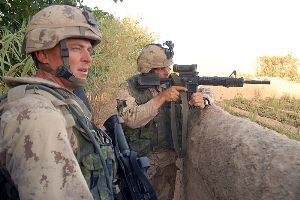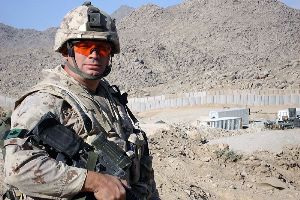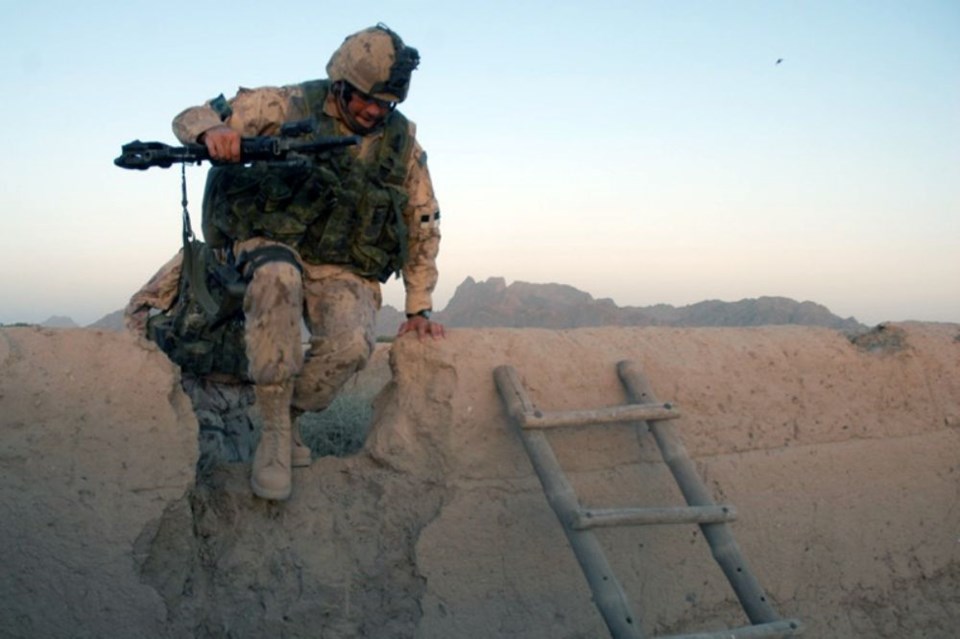THUNDER BAY -- The exploits of a Thunder Bay-born Canadian Armed Forces colonel are featured in an Afghanistan War documentary series airing on The History Channel this week.
On Tuesday, two of War Story Afghanistan's six episodes will focus on Col. Geoffrey Abthorpe, who commanded Canadian troops to victory through Operation Medusa in September 2006.
Four hundred Taliban fighters were repelling the NATO-led force at the foot of a mountain outside of Kandahar. Abthorpe was the third leader to take command of the 165-member team. The use of force had been restricted and coalition troops were suffering heavy casualties.
Under new leadership, Operation Medusa’s tide was about to turn.
 “I was given greater rules of engagement and freedom of action to take the objective,” Abthorpe explained.
“I was given greater rules of engagement and freedom of action to take the objective,” Abthorpe explained.
The Colonel had developed a reputation for leading from the front, often on foot. He ordered his team to circumvent the explosive-laden roads and cut through fields toward the town in a bid to change the battle’s focal point.
The strategy brought what Abthorpe described as the coalition’s “overwhelming firepower and superior abilities” into close range and the battle was won.
Thirty-eight Canadian soldiers were wounded in Operation Medusa but only one soldier was lost during that third command: Pte. Josh Klukie from Thunder Bay. Abthorpe still commemorates the local man’s life every year on Remembrance Day.
Those injuried soldiers and others tell their stories in the documentary episode. Abthorpe was among those who attended a private pre-screening with Ontario Lieutenant Governor, Elizabeth Dowdeswell.
“There wasn’t a dry eye in the room,” he said.
“Some are very emotional because people are telling stories that they repressed in the backs of their minds for a number of years up until we did this documentary.”
The second episode featuring Abthorpe is entitled Hearts And Minds, a critical look at the outreach effort to legitimize the elected Afghan government. The Canadians focused on promising to refurbish wells in Afghan communities to gain their support by providing water.
“I didn’t go so well. We had an inability to get the right kind of resources from Canada,” he said.
“Do you think in three months we could find sparkplugs that worked for their ancient engines? No. We even made appeals through the supply chain to get that particular sparkplug but we couldn’t achieve it.”
 The Taliban had better resources at its command to convince rural communities to offer its soldiers food, shelter, safe passage.
The Taliban had better resources at its command to convince rural communities to offer its soldiers food, shelter, safe passage.
There were some successes, including giving firewood to Afghanis in November and providing 90 patients with medical care.
Abthorpe described the point of view of a man who lived near the mountain that claimed to be 104 years old.
“He said, ‘the British left, the Russians left, the Taliban will leave, the Coalition will leave and I’ll still be here in my village and I’ll still be tending my crops,’” Abthorpe recalled.
“It’s not that he didn’t completely trust us but I think in the end, they don’t really need us to change their 12th century way of life. When you put it in that perspective, they’re happy doing what they’re doing up there.’
War Story Afghanistan will air on the History Channel each night this week at 8 p.m. and 10 p.m.
Sign in or register
- Messages
- Post a Listing
- Your Listings
- Your Profile
- Your Subscriptions
- Your Likes
- Your Business
- Support Local News
- Payment History
Registered Users
Already have an account?
New Users
Create a free account.
